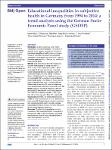Educational inequalities in subjective health in Germany from 1994 to 2014: a trend analysis using the German Socio-Economic Panel study (GSOEP)
Moor, Irene
Günther, Sebastian
Knöchelmann, Anja
Hoebel, Jens
Pförtner, Timo-Kolja
Lampert, Thomas
Richter, Matthias
Introduction As trend studies have shown, health inequalities by income and occupation have widened or remained stable. However, research on time trends in educational inequalities in health in Germany is scarce. The aim of this study is to analyse how educational inequalities in health evolved over a period of 21 years in the middle-aged population in Germany, and whether the trends differ by gender.
Methods Data were obtained from the German Socio-Economic Panel covering the period from 1994 to 2014. In total, n=16 339 participants (106 221 person years) aged 30–49 years were included in the study sample. Educational level was measured based on the ‘Comparative Analysis of Social Mobility in Industrial Nations’ (CASMIN) classification. Health outcomes were self-rated health (SRH) as well as (mental and physical) health-related quality of life (HRQOL, SF-12v2). Absolute Index of Inequality (Slope Index of Inequality (SII)) and Relative Index of Inequality (RII) were calculated using linear and logarithmic regression analyses with robust SEs.
Results Significant educational inequalities in SRH and physical HRQOL were found for almost every survey year from 1994 to 2014. Relative inequalities in SRH ranged from 1.50 to 2.10 in men and 1.25 to 1.87 in women (RII). Regarding physical HRQOL, the lowest educational group yielded 4.5 to 6.6 points (men) and 3.3 to 6.1 points (women) lower scores (SII). Although educational level increased over time, absolute and relative health inequalities remained largely stable over the last 21 years. For mental HRQOL, only few educational inequalities were found.
Discussion This study found persistent educational inequalities in SRH and physical HRQOL among adults in Germany from 1994 to 2014. Our findings highlight the need to intensify efforts in social and health policies to tackle these persistent inequalities.

